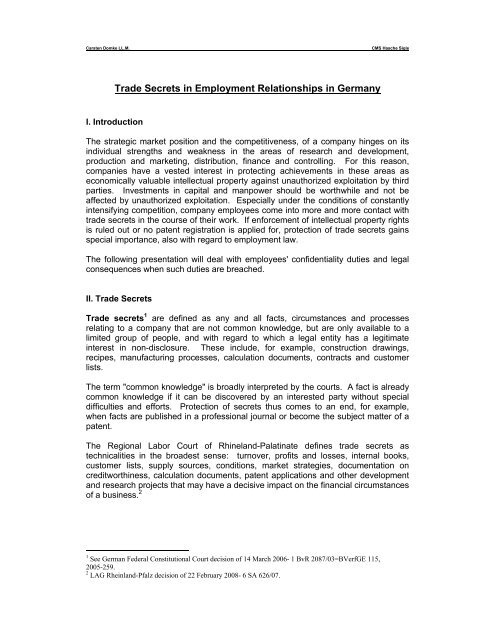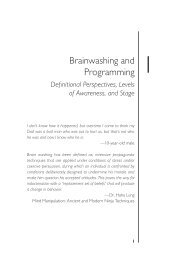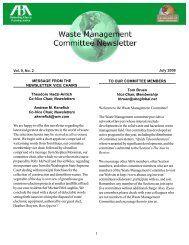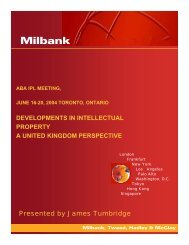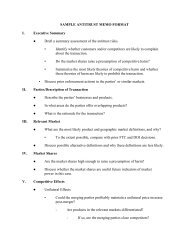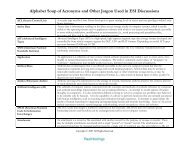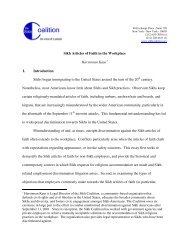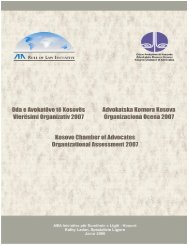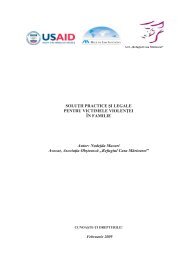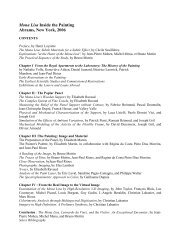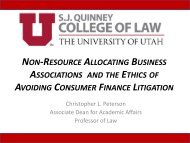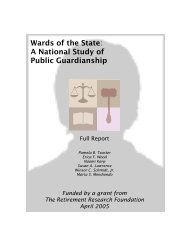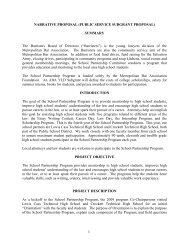Trade Secrets in Employment Relationships in Germany
Trade Secrets in Employment Relationships in Germany
Trade Secrets in Employment Relationships in Germany
You also want an ePaper? Increase the reach of your titles
YUMPU automatically turns print PDFs into web optimized ePapers that Google loves.
Carsten Domke LL.M. CMS Hasche Sigle<br />
I. Introduction<br />
<strong>Trade</strong> <strong>Secrets</strong> <strong>in</strong> <strong>Employment</strong> <strong>Relationships</strong> <strong>in</strong> <strong>Germany</strong><br />
The strategic market position and the competitiveness, of a company h<strong>in</strong>ges on its<br />
<strong>in</strong>dividual strengths and weakness <strong>in</strong> the areas of research and development,<br />
production and market<strong>in</strong>g, distribution, f<strong>in</strong>ance and controll<strong>in</strong>g. For this reason,<br />
companies have a vested <strong>in</strong>terest <strong>in</strong> protect<strong>in</strong>g achievements <strong>in</strong> these areas as<br />
economically valuable <strong>in</strong>tellectual property aga<strong>in</strong>st unauthorized exploitation by third<br />
parties. Investments <strong>in</strong> capital and manpower should be worthwhile and not be<br />
affected by unauthorized exploitation. Especially under the conditions of constantly<br />
<strong>in</strong>tensify<strong>in</strong>g competition, company employees come <strong>in</strong>to more and more contact with<br />
trade secrets <strong>in</strong> the course of their work. If enforcement of <strong>in</strong>tellectual property rights<br />
is ruled out or no patent registration is applied for, protection of trade secrets ga<strong>in</strong>s<br />
special importance, also with regard to employment law.<br />
The follow<strong>in</strong>g presentation will deal with employees' confidentiality duties and legal<br />
consequences when such duties are breached.<br />
II. <strong>Trade</strong> <strong>Secrets</strong><br />
<strong>Trade</strong> secrets 1 are def<strong>in</strong>ed as any and all facts, circumstances and processes<br />
relat<strong>in</strong>g to a company that are not common knowledge, but are only available to a<br />
limited group of people, and with regard to which a legal entity has a legitimate<br />
<strong>in</strong>terest <strong>in</strong> non-disclosure. These <strong>in</strong>clude, for example, construction draw<strong>in</strong>gs,<br />
recipes, manufactur<strong>in</strong>g processes, calculation documents, contracts and customer<br />
lists.<br />
The term "common knowledge" is broadly <strong>in</strong>terpreted by the courts. A fact is already<br />
common knowledge if it can be discovered by an <strong>in</strong>terested party without special<br />
difficulties and efforts. Protection of secrets thus comes to an end, for example,<br />
when facts are published <strong>in</strong> a professional journal or become the subject matter of a<br />
patent.<br />
The Regional Labor Court of Rh<strong>in</strong>eland-Palat<strong>in</strong>ate def<strong>in</strong>es trade secrets as<br />
technicalities <strong>in</strong> the broadest sense: turnover, profits and losses, <strong>in</strong>ternal books,<br />
customer lists, supply sources, conditions, market strategies, documentation on<br />
creditworth<strong>in</strong>ess, calculation documents, patent applications and other development<br />
and research projects that may have a decisive impact on the f<strong>in</strong>ancial circumstances<br />
of a bus<strong>in</strong>ess. 2<br />
1<br />
See German Federal Constitutional Court decision of 14 March 2006- 1 BvR 2087/03=BVerfGE 115,<br />
2005-259.<br />
2<br />
LAG Rhe<strong>in</strong>land-Pfalz decision of 22 February 2008- 6 SA 626/07.<br />
L:\JOBS\42179 ABA LEL\42179_Book vol 1\WIP files\Papers\125_Domke.doc<br />
1
Carsten Domke LL.M. CMS Hasche Sigle<br />
III. Protection of <strong>Trade</strong> <strong>Secrets</strong><br />
A company can protect its confidential <strong>in</strong>formation by way of <strong>in</strong>tellectual property<br />
rights, such as patents or copyrights, by way of general non-disclosure clauses <strong>in</strong><br />
employment contracts, or by way of separate agreements.<br />
As a rule, employees are obligated to hold trade secrets <strong>in</strong> confidence and not to<br />
disclose them to third parties. With regard to time, however, a dist<strong>in</strong>ction must be<br />
made between non-disclosure obligations dur<strong>in</strong>g a term of employment and pre- or<br />
post-contractual obligations.<br />
1. Non-Disclosure Obligation Dur<strong>in</strong>g <strong>Employment</strong>:<br />
An employee's duty to hold trade secrets <strong>in</strong> confidence arises from the employment<br />
contract itself. Based on their contractual duty to show consideration for the bus<strong>in</strong>ess<br />
<strong>in</strong>terests of their employers, employees are obligated to keep trade secrets, even<br />
without any special provision. This also arises as a result of the pr<strong>in</strong>ciple of good<br />
faith. Special agreements concern<strong>in</strong>g the protection of secrets are often also<br />
<strong>in</strong>cluded <strong>in</strong> written employment contracts. When such confidentiality agreements<br />
exceed the statutory scope by lead<strong>in</strong>g to an excessive contractual obligation for<br />
employees without this be<strong>in</strong>g justifiable ow<strong>in</strong>g to special company <strong>in</strong>terests, they are<br />
<strong>in</strong>valid pursuant to §134 and §138 of the German Civil Code (BGB) (statutory<br />
prohibition, <strong>in</strong> violation of moral pr<strong>in</strong>ciples) (see IV. Requirements for Confidentiality<br />
Clauses <strong>in</strong> <strong>Employment</strong> Agreements).<br />
An employee's immanent contractual obligation to show consideration for the<br />
employer's <strong>in</strong>terests is not limited to trade secrets, but <strong>in</strong>cludes all processes and<br />
facts with which the employee becomes acqua<strong>in</strong>ted <strong>in</strong> connection with his or her<br />
position <strong>in</strong> the bus<strong>in</strong>ess establishment and which it is <strong>in</strong> the employer's <strong>in</strong>terest to<br />
keep secret.<br />
2. Non-Disclosure Obligation Prior to <strong>Employment</strong>:<br />
Confidentiality obligations, so-called "pre-contractual confidentiality duties", can<br />
already be established <strong>in</strong> the course of hir<strong>in</strong>g negotiations. Dur<strong>in</strong>g negotiations<br />
concern<strong>in</strong>g an employment contract, however, there is only a limited confidentiality<br />
duty, and evidence must be presented show<strong>in</strong>g that the future party to the contract<br />
has culpably breached it.<br />
3. Non-Disclosure Obligation After the End of <strong>Employment</strong>:<br />
Especially after the end of employment, there are confidentiality obligations for<br />
employees.<br />
Accord<strong>in</strong>g to case law of the Federal Labor Court, employees are obligated to hold<br />
trade secrets <strong>in</strong> confidence after term<strong>in</strong>ation of their employment even without any<br />
special agreement to that effect solely on the basis of general fiduciary obligations<br />
hav<strong>in</strong>g retroactive effect or on the basis of secondary obligations aris<strong>in</strong>g from the<br />
employment relationship. 3 The Federal Labor Court deems such conduct to be <strong>in</strong><br />
3 BAG decision of 16 August 1990, NZA 1991, 141.<br />
L:\JOBS\42179 ABA LEL\42179_Book vol 1\WIP files\Papers\125_Domke.doc<br />
2
Carsten Domke LL.M. CMS Hasche Sigle<br />
breach of trust under §1 of the German Unfair Competition Act (Gesetz gegen den<br />
unlauteren Wettbewerb, UWG) and §823 and §826 of the Civil Code (concern<strong>in</strong>g<br />
tortious acts and <strong>in</strong>tentional unethical damage). 4<br />
It is possible to agree on a more extensive confidentiality obligation for a specified<br />
period follow<strong>in</strong>g the end of employment already <strong>in</strong> employment contracts or by way of<br />
a separate post-contractual protection of secrets.<br />
Court Rul<strong>in</strong>g<br />
In a decision rendered on 27 April 2006, the German Federal Court of<br />
Justice (BGH) dealt with misappropriation of a customer list and use of it<br />
after the end of employment. The employee had obta<strong>in</strong>ed the list of<br />
customer data <strong>in</strong> the course of his employment. The Federal Court of<br />
Justice ruled that, although it is true that employees may make use of<br />
knowledge acquired dur<strong>in</strong>g their term of employment without restrictions<br />
later as long as they are not under obligation not to compete with their<br />
former employers, this right concerns only <strong>in</strong>formation that employees reta<strong>in</strong><br />
<strong>in</strong> their memories. The right to make use of acquired knowledge after<br />
term<strong>in</strong>ation of employment, even to the detriment of the former employer,<br />
does not, however, apply to <strong>in</strong>formation to which a former employee has<br />
access only because he is able to draw on written documents from his term<br />
of employment. Such <strong>in</strong>formation, for example, <strong>in</strong> private, written records or<br />
<strong>in</strong> the form of a file saved on a private notebook, are deemed trade secrets<br />
and are thus protected. 5<br />
4. Other Special Non-Disclosure Obligations<br />
There are other confidentiality obligations that apply to works council members 6 and<br />
to tra<strong>in</strong>ees 7 . No special rules apply to manag<strong>in</strong>g directors because of their positions<br />
as members of the board. The pr<strong>in</strong>ciples that apply to employees apply to them;<br />
however, the special relationship of trust is to be taken <strong>in</strong>to account.<br />
IV. Requirements for Non-Disclosure Clauses <strong>in</strong> <strong>Employment</strong> Agreements<br />
The parties to employment agreements may validly stipulate that an employee may<br />
not use or share specified trade secrets of which he ga<strong>in</strong>s knowledge as a result of<br />
his work either while still employed or after term<strong>in</strong>ation of employment.<br />
Confidentiality clauses may be declaratory or substantiate law <strong>in</strong> terms of the scope<br />
of their subject matter with the consequence that they do not have <strong>in</strong>dependent<br />
substance and are merely descriptive of the protection of secrets that is already<br />
4<br />
BAG decision of 15 June 1993, NZA 94, 502.<br />
5<br />
BGH decision of 27 April 2006 – I ZR 126/03.<br />
6<br />
under §79 and §99(1), third sentence, of the German Works Constitution Act (Betriebsverfassungsgesetz,<br />
BetrVG)<br />
7<br />
under §9 No. 6 of the Federal Academic Tra<strong>in</strong><strong>in</strong>g and Assistance Act (Bundesausbildungsgesetz, BBiG)<br />
L:\JOBS\42179 ABA LEL\42179_Book vol 1\WIP files\Papers\125_Domke.doc<br />
3
Carsten Domke LL.M. CMS Hasche Sigle<br />
provided under statutory law. However, the requirements for more extensive<br />
agreements are str<strong>in</strong>gent.<br />
"All-encompass<strong>in</strong>g confidentiality clauses" subject all bus<strong>in</strong>ess events of which<br />
an employee becomes aware while employed to the duty of confidentiality and thus<br />
exceed statutory confidentiality obligations, particularly those conta<strong>in</strong>ed <strong>in</strong> §17 and<br />
§18 of the Unfair Competition Act. The employees are thus not allowed to make<br />
professional use of the knowledge they have acquired <strong>in</strong> the sector. Such a<br />
provision is thus to be treated like a non-compete clause with<strong>in</strong> the mean<strong>in</strong>g of §74 ff.<br />
of the German Commercial Code (Handelsgesetzbuch, HGB), with the consequence<br />
that it will be b<strong>in</strong>d<strong>in</strong>g only if a compensation payment for the employee <strong>in</strong> question<br />
was agreed upon at the same time.<br />
Accord<strong>in</strong>g to case law of the Federal Labor Court, such confidentiality clauses<br />
without a stipulation of compensation are <strong>in</strong>valid ow<strong>in</strong>g to their <strong>in</strong>tensity. 8<br />
When trade secrets are less important, the term of the post-contractual confidentiality<br />
duty should also be reduced. For trade secrets of extreme importance, this term can<br />
exceed two years <strong>in</strong> exceptional cases.<br />
Accord<strong>in</strong>g to §310(4), second sentence, of the Civil Code, an <strong>in</strong>valid contractual<br />
clause that is significantly detrimental to an employee cannot be reduced to preserve<br />
its validity.<br />
"Restricted confidentiality clauses" are allowed as long as they restrict the trade<br />
secrets <strong>in</strong> terms of subject matter to those that are of particular importance for the<br />
company, so that the company has a legitimate <strong>in</strong>terest <strong>in</strong> keep<strong>in</strong>g them secret. If<br />
this is done, it is generally assumed that the company's <strong>in</strong>terest <strong>in</strong> confidentiality<br />
outweighs the employee's <strong>in</strong>terest <strong>in</strong> professional advancement. 9 The explosive<br />
nature of a trade secret is thus determ<strong>in</strong>ative for the assumption of a legitimate<br />
<strong>in</strong>terest <strong>in</strong> secrecy. <strong>Trade</strong> secrets should be specified precisely.<br />
With regard to the temporal scope of confidentiality clauses <strong>in</strong> employment contracts,<br />
it must be considered whether and to what extent the employee has to rely on use of<br />
acquired knowledge for professional advancement. When weigh<strong>in</strong>g the conflict<strong>in</strong>g<br />
<strong>in</strong>terests, the extent to which the employee was <strong>in</strong>volved <strong>in</strong> the creation of the secret<br />
is relevant, because otherwise the employee's use of professional knowledge based<br />
on experience might be impermissibly restricted.<br />
In any case, if an employee's <strong>in</strong>terest <strong>in</strong> freedom of occupation outweighs the<br />
company's <strong>in</strong>terest <strong>in</strong> secrecy, it is impermissible to permanently forbid him to make<br />
use of a secret. If the company-specific issues cannot affect the employee's freedom<br />
of occupation, the Federal Labor Court considers the boundary for a post-contractual<br />
non-compete clause to be overstepped, and a confidentiality obligation can be validly<br />
agreed upon only by way of post-contractual non-compete clause with compensation<br />
and for a maximum term of two years. The maximum term will also be assumed if an<br />
employee is forbidden to make any use whatsoever of professional knowledge based<br />
on experience.<br />
8 BAG decision of 16 March 1982, 3 AZR 83, 79.<br />
9 Gaul, NZA 1988, 230; Kunz, DB 1993, 2482; Mes, GRUR 1979, 583.<br />
L:\JOBS\42179 ABA LEL\42179_Book vol 1\WIP files\Papers\125_Domke.doc<br />
4
Carsten Domke LL.M. CMS Hasche Sigle<br />
Example of a Confidentiality Clause <strong>in</strong> an <strong>Employment</strong> Agreement:<br />
"For the duration of his/her employment, the Employee undertakes to hold <strong>in</strong><br />
confidence all bus<strong>in</strong>ess and trade secrets and bus<strong>in</strong>ess events of which he/she<br />
becomes aware dur<strong>in</strong>g the term of this Agreement. This confidentiality obligation<br />
shall cont<strong>in</strong>ue to apply after the term<strong>in</strong>ation of employment with regard to the<br />
follow<strong>in</strong>g bus<strong>in</strong>ess and trade secrets: […]<br />
This confidentiality obligation shall not extend to such knowledge that is generally<br />
accessible or to knowledge the disclosure of which is clearly not detrimental to the<br />
company. In the case of doubt, the Employee shall be obligated to obta<strong>in</strong> a directive<br />
from management on whether a specific fact is to be held <strong>in</strong> confidence." 10<br />
V. Protection of <strong>Trade</strong> <strong>Secrets</strong> Under Crim<strong>in</strong>al Law<br />
<strong>Trade</strong> secrets that are targets of <strong>in</strong>dustrial espionage are protected under crim<strong>in</strong>al<br />
law, primarily by §17 of the Unfair Competition Act and §266 of the German Crim<strong>in</strong>al<br />
Code (Strafgesetzbuch, StGB) and further by §18 and §19 of the Unfair Competition<br />
Act, and also by §202a, §203 and §204 of the Crim<strong>in</strong>al Code.<br />
The key statute <strong>in</strong> practice is §17 of the Unfair Competition Act. Under subsection 1<br />
of this statute, a betrayal of trade secrets by a person employed by the affected<br />
company dur<strong>in</strong>g the term of employment carries a penalty. The offender can thus<br />
only be an employee of the company.<br />
Section 17 of the Unfair Competition Act reads as follows:<br />
"(1) A prison sentence not exceed<strong>in</strong>g three years of a f<strong>in</strong>e shall be imposed on<br />
any employee, workman or apprentice of a bus<strong>in</strong>ess enterprise who dur<strong>in</strong>g the<br />
term of his employment, without authorization, communicates to a third party a<br />
trade or <strong>in</strong>dustrial secret that has been confided to him or made available to him<br />
by virtue of his employment, if he does so for purposes of competition, for<br />
personal ga<strong>in</strong>, for the benefit of a third party or with the <strong>in</strong>tention of damag<strong>in</strong>g<br />
the proprietor of the bus<strong>in</strong>ess.<br />
(2) The same punishment shall be imposed on anyone who, for purposes of<br />
competition, for personal ga<strong>in</strong>, for the benefit of a third party or with the <strong>in</strong>tention<br />
of damag<strong>in</strong>g the proprietor of the bus<strong>in</strong>ess,<br />
1. obta<strong>in</strong>s or secures a trade or <strong>in</strong>dustrial secret without authorization through<br />
a. the use of technical means,<br />
b. the creation of an embodied reproduction of the secret, or<br />
c. the removal of an item <strong>in</strong> which the secret is embodied, or<br />
10 Arbeitsrechtliches Formular- und Verfahrungshandbuch, 9 th ed. 2998, §2 Arbeitsverträge für Angestellte,<br />
Marg<strong>in</strong> No. 25.<br />
L:\JOBS\42179 ABA LEL\42179_Book vol 1\WIP files\Papers\125_Domke.doc<br />
5
Carsten Domke LL.M. CMS Hasche Sigle<br />
2. uses or communicates to anyone without authorization a trade or <strong>in</strong>dustrial<br />
secret which he has acquired or otherwise obta<strong>in</strong>ed or secured without<br />
authorization through a communication as described <strong>in</strong> subsection 1 or through<br />
an act of his own or of another person under paragraph 1.<br />
(3) The attempt shall be punishable.<br />
(4) In particularly serious cases, a prison sentence not exceed<strong>in</strong>g five years or a<br />
f<strong>in</strong>e shall be imposed. A particularly serious case shall be generally deemed to<br />
exist if the perpetrator<br />
1. acts commercially,<br />
2. knows at the time of communication that the secret is to be used <strong>in</strong> a foreign<br />
country,<br />
or<br />
3. if he himself makes use of it <strong>in</strong> a foreign country as described <strong>in</strong> subsection<br />
(2), paragraph 2.<br />
(5) The offense shall be prosecuted only upon application unless the<br />
prosecut<strong>in</strong>g authority deems official <strong>in</strong>tervention necessary ow<strong>in</strong>g to particular<br />
public <strong>in</strong>terest <strong>in</strong> prosecution.<br />
(6) Section 5, No. 7 of the Crim<strong>in</strong>al Code shall apply analogously.<br />
Simple acquisition of knowledge, alone, goes unpunished. Long-term retention of<br />
secrets by way of memory goes unpunished as well. Section 17(2) No. 2 of the<br />
Unfair Competition Act provides sanctions for trad<strong>in</strong>g <strong>in</strong> secrets.<br />
In the <strong>in</strong>terest of a comprehensive protection of trade secrets, the elements of<br />
offense under §17 of the Unfair Competition Act are supplemented by the provisions<br />
conta<strong>in</strong>ed <strong>in</strong> §18 and §19 of the Unfair Competition Act.<br />
Section 18 of the Unfair Competition Act protects the knowledge of a company set<br />
out <strong>in</strong> models or <strong>in</strong>structions of a technical nature aga<strong>in</strong>st abuse of trust <strong>in</strong> bus<strong>in</strong>ess<br />
relationships. This does not have to refer to trade secrets <strong>in</strong> the narrower sense.<br />
Section 18 of the Unfair Competition Act serves, <strong>in</strong> particular, to protect technical<br />
knowledge that is made available to other companies with<strong>in</strong> the framework of knowhow<br />
agreements or subsequently failed contract negotiations.<br />
Section 19 of the Unfair Competition Act provides crim<strong>in</strong>al law protection for <strong>in</strong>dustrial<br />
secrets already prior to their violation <strong>in</strong> that the attempt to <strong>in</strong>duce another to violate<br />
§17 or §18 or the offer to commit such violation can result <strong>in</strong> a penalty.<br />
If the prerequisites of §17 of the Unfair Competition Act are met, the elements of<br />
betrayal of confidence by abus<strong>in</strong>g rights under §266(1), second alternative, of the<br />
Crim<strong>in</strong>al Code are often also met if the offender had a duty to safeguard the assets of<br />
L:\JOBS\42179 ABA LEL\42179_Book vol 1\WIP files\Papers\125_Domke.doc<br />
6
Carsten Domke LL.M. CMS Hasche Sigle<br />
the damaged company. This is always true with regard to members of the board and<br />
executive employees, as well as all employees who have a say <strong>in</strong> events <strong>in</strong> the<br />
company. What is necessary is that such a person has a fundamental duty of care<br />
with regard to the f<strong>in</strong>ancial <strong>in</strong>terests of the company.<br />
An employee is always <strong>in</strong> breach of his duty to safeguard assets if he communicates<br />
an <strong>in</strong>dustrial secret that has been confided <strong>in</strong> him or makes use of it for himself or for<br />
others.<br />
Accord<strong>in</strong>g to §202a of the Crim<strong>in</strong>al Code (data espionage), it is also a crim<strong>in</strong>al<br />
offense for a person to obta<strong>in</strong> data for himself or another, without authorization, that<br />
was specially protected aga<strong>in</strong>st unauthorized access and that was stored <strong>in</strong> such a<br />
way that it was not directly perceivable or was be<strong>in</strong>g transmitted. This can <strong>in</strong>clude<br />
secret trade and bus<strong>in</strong>ess data. The penalty can be imprisonment not exceed<strong>in</strong>g<br />
three years or a f<strong>in</strong>e.<br />
Under §203 and §204 of the Crim<strong>in</strong>al Code (violation of private secrets), trade<br />
secrets are expressly <strong>in</strong>cluded <strong>in</strong> the protected secrets confided <strong>in</strong> specified<br />
professionals, such as officeholders. They are protected there aga<strong>in</strong>st disclosure<br />
and exploitation even without the subjective prerequisites set out <strong>in</strong> §17 of the Unfair<br />
Competition Act be<strong>in</strong>g met. An offender faces imprisonment not exceed<strong>in</strong>g one year<br />
under §203 of the Crim<strong>in</strong>al Code and not exceed<strong>in</strong>g two years under §204 of the<br />
Crim<strong>in</strong>al Code or a f<strong>in</strong>e.<br />
If one of the provisions of crim<strong>in</strong>al law has been violated, sanctions imposed dur<strong>in</strong>g<br />
employment can be based on such violation.<br />
VI. Punitive Provisions Under Labor Law, Corporate Law and Commercial Law<br />
There are explicit provisions under commercial law, particularly corporate law, for the<br />
protection of trade secrets, such as §90 of the Commercial Code, accord<strong>in</strong>g to which<br />
commercial agents may not exploit trade secrets confided <strong>in</strong> them, §79 and §120 of<br />
the German Works Constitution Act, accord<strong>in</strong>g to which members and substitute<br />
members of works councils may not exploit trade secrets of which they ga<strong>in</strong><br />
knowledge through their membership, or §404 of the German Stock Corporation Act<br />
(Aktiengesetz), accord<strong>in</strong>g to which members of management boards or supervisory<br />
boards may not disclose trade secrets to third parties.<br />
The different provisions all have a uniform structure. The elements of the offenses<br />
<strong>in</strong>clude the acts of reveal<strong>in</strong>g secrets that offenders ga<strong>in</strong>ed knowledge of as<br />
officeholders of a company and exploit<strong>in</strong>g them without authorization. Reveal<strong>in</strong>g a<br />
secret means any communication of it to a third party. The attempt to do so is not a<br />
crim<strong>in</strong>al offense. The penalty is imprisonment not exceed<strong>in</strong>g one year or a f<strong>in</strong>e.<br />
Aggravated offenses are cases <strong>in</strong> which an offender acts <strong>in</strong> return for payment or<br />
with the <strong>in</strong>tent of enrich<strong>in</strong>g himself or others or of harm<strong>in</strong>g another party (§404(1),<br />
second sentence, of the Stock Corporation Act, §333 of the Commercial Code,<br />
§120(3), first sentence of the Works Constitution Act.<br />
However, these provisions have not ga<strong>in</strong>ed any particular importance <strong>in</strong> practice to<br />
date because their restriction to a group of offenders, the necessity of fil<strong>in</strong>g charges<br />
L:\JOBS\42179 ABA LEL\42179_Book vol 1\WIP files\Papers\125_Domke.doc<br />
7
Carsten Domke LL.M. CMS Hasche Sigle<br />
and the low penalties always cause §17 of the Unfair Competition Act to be applied <strong>in</strong><br />
important cases.<br />
VII. Labor Law Consequences and Damages<br />
When employees breach their confidentiality obligations, there are consequences<br />
under labor law, and not only under crim<strong>in</strong>al law. What labor law <strong>in</strong>struments come<br />
<strong>in</strong>to consideration for an employer depends on whether the violation was committed<br />
prior to the commencement of employment, dur<strong>in</strong>g employment or <strong>in</strong> the postcontractual<br />
area.<br />
1. Prior to Commencement of <strong>Employment</strong><br />
In the pre-contractual area, a company can assert damage claims based on a<br />
breach of pre-contractual protective duties under §311(2) and §241(2) of the Civil<br />
Code. Because it is often difficult to calculate the amount of damage done, the<br />
courts have developed the pr<strong>in</strong>ciples of triple damage calculation accord<strong>in</strong>g to which<br />
the damaged party has a right to choose whether to calculate the actual damage, to<br />
be paid a reasonable license fee or to be awarded the net profits of the offender.<br />
The calculation of actual damage corresponds to the system of the general law on<br />
compensation. The company must provide proof of the actual loss <strong>in</strong>curred. The<br />
damage then <strong>in</strong>cludes the actual <strong>in</strong>curred asset reduction and the <strong>in</strong>crease of assets<br />
that did not take place.<br />
Alternatively, the company can demand payment of a reasonable license fee. The<br />
amount is then calculated on the basis of what a reasonable licensor would have<br />
charged and a reasonable licensee would have paid if a license agreement had been<br />
concluded if both parties had been familiar with the circumstances of the case at the<br />
time of the decision. 11<br />
Courts have awarded license fees between 1 percent and 12.5 percent. The<br />
calculation of damage is done objectively, regardless of whether the employer has <strong>in</strong><br />
fact lost profits, and if so, <strong>in</strong> what amount.<br />
The company may also demand the net profit ga<strong>in</strong>ed by the offender; it is implied<br />
that the company would have ga<strong>in</strong>ed the same profit that the offender did. In this<br />
case, the company must prove that the offense <strong>in</strong> all probability caused the company<br />
to <strong>in</strong>cur a loss and the offender to ga<strong>in</strong> a profit.<br />
2. Dur<strong>in</strong>g <strong>Employment</strong><br />
In the event of breaches of confidentiality obligations dur<strong>in</strong>g employment, employers<br />
may dismiss such employees without notice for good cause, <strong>in</strong> addition to fil<strong>in</strong>g<br />
claims for damages <strong>in</strong> accordance with the above-mentioned pr<strong>in</strong>ciples, because<br />
communication of trade secrets, as well as the suspicion 12 that secrets have been<br />
11<br />
BGHZ 44, 372, 380 f., BGHZ 77, 16, 27.<br />
12<br />
BAG decision of 26 September 1990, 2 AZR 602/89; decision of 17 August 2001, Landesarbeitsgericht Köln,<br />
11(7) Sa 484/00.<br />
L:\JOBS\42179 ABA LEL\42179_Book vol 1\WIP files\Papers\125_Domke.doc<br />
8
Carsten Domke LL.M. CMS Hasche Sigle<br />
betrayed, constitutes good cause for term<strong>in</strong>ation without notice under §626(1) of the<br />
Civil Code. 13 .<br />
Court Rul<strong>in</strong>g<br />
The decision of the Regional Labor Court of Berl<strong>in</strong> rendered on 10 July 2003<br />
dealt with a case <strong>in</strong> which an employee had copied a considerable number<br />
of files belong<strong>in</strong>g to her employer. These files were projects lists <strong>in</strong>clud<strong>in</strong>g<br />
names of customers, names of project leaders, descriptions of projects, offer<br />
prices and general company data. The court held the op<strong>in</strong>ion that the<br />
employee's act constituted an <strong>in</strong>tentional betrayal of trade secrets that gave<br />
the employer the right to dismiss her for good cause and without giv<strong>in</strong>g her<br />
prior warn<strong>in</strong>g. 14<br />
Employers are also entitled to an <strong>in</strong>junction aga<strong>in</strong>st future offenses pursuant to §8(1)<br />
of the Unfair Competition Act <strong>in</strong> conjunction with §3 of the Unfair Competition Act if<br />
employees have committed acts of unfair competition. If there was no competitive<br />
purpose, the employer is entitled to an <strong>in</strong>junction <strong>in</strong> any case based on tortious acts<br />
pursuant to §823(1) and §1004 of the Civil Code. In urgent cases, an action can be<br />
filed for a prelim<strong>in</strong>ary <strong>in</strong>junction.<br />
In preparation for actions for damages and <strong>in</strong>junctions, companies are also entitled,<br />
under §242 of the Civil Code (good faith), to demand <strong>in</strong>formation from offenders if<br />
they lack <strong>in</strong>formation to assert their claims, for example, for the calculation of lost<br />
profits, on the amount of profits ga<strong>in</strong>ed that was made possible by us<strong>in</strong>g the trade<br />
secret.<br />
3. After the End of <strong>Employment</strong><br />
If employees breach their post-contractual confidentiality obligations after the end of<br />
their employment, their former employers may assert compensation claims <strong>in</strong><br />
accordance with the above-mentioned pr<strong>in</strong>ciples.<br />
VIII. Conclusion<br />
This shows that <strong>in</strong> <strong>Germany</strong> applicable law, primarily §17 of the Unfair Competition<br />
Act and §2667 of the Crim<strong>in</strong>al Code, conta<strong>in</strong>s statutes provid<strong>in</strong>g comprehensive<br />
protection for trade secrets. In addition, companies can impose obligations on their<br />
employees by way of contractual clauses to hold trade secrets <strong>in</strong> confidence if they<br />
restrict such clauses <strong>in</strong> employment agreements to specified trade secrets.<br />
Otherwise, the boundary for a prohibition on competition without compensation and<br />
limited <strong>in</strong> terms of time to a maximum of two years would be overstepped, with the<br />
result that employers would be obligated to compensate their employees.<br />
13 Decision of 12 November 2004, Landesarbeitsgericht Rhe<strong>in</strong>land-Pfalz, 8 Sa 460/04; decision of 15 June 1967,<br />
Landesarbeitsgericht München, 1 Sa 648/67.<br />
14 LAG Berl<strong>in</strong> decision of 10 July 2003 – 16 Sa 545/03.<br />
L:\JOBS\42179 ABA LEL\42179_Book vol 1\WIP files\Papers\125_Domke.doc<br />
9
Carsten Domke LL.M. CMS Hasche Sigle<br />
Employers may dismiss employees without notice for good cause if they commit a<br />
material breach of their confidentiality obligations. Case law of the Federal Court of<br />
Justice concern<strong>in</strong>g a triple damage calculation makes it easier for a damaged<br />
company to calculate the damage it has <strong>in</strong>curred. In practice, preventive measures<br />
cont<strong>in</strong>ue to be of decisive importance, and they should be implemented through a<br />
calculation of the need for protection <strong>in</strong> <strong>in</strong>dividual areas, a risk assessment and a<br />
comprehensive <strong>in</strong>formation and security policy.<br />
L:\JOBS\42179 ABA LEL\42179_Book vol 1\WIP files\Papers\125_Domke.doc<br />
10


